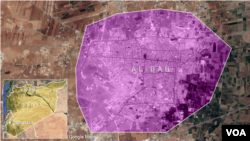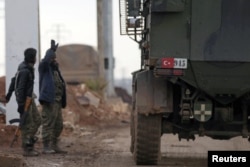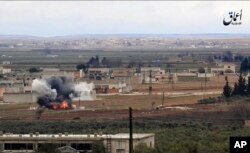Turkish media report thousands more soldiers will be sent into Syria, as Turkish forces struggle to recapture the strategically important town of al-Bab from so-called Islamic State.
Last month, 16 Turkish soldiers were killed in one attack in al-Bab, where jihadists increasingly are using suicide bombers and truck bombs in the fight over the town.
"The conflict is proving to be much more difficult; al-Bab has still not been captured," said Al-Monitor website political columnist Semih Idiz. He argued the battle for the town has become politically important.
"Although statements from the [Turkish] president recently were suggesting it was imminent, it was a matter of time; it still has not happened," he said. "So what do you do? We know it from Vietnam, we know it from all over the place, the first reaction is to pour in more soldiers.That already shows you are being sucked in."
The Turkish Army launched Operation Euphrates Shield last August, ostensibly to support the Free Syrian Army, or FSA, the rebel group fighting with Turkish forces in Syria.
Retired Brigadier General Haldun Solmazturk heads the 21st Century Turkey Institute, an Ankara-based research group. He said the battle for al-Bab has revealed crucial shortcomings in the FSA.
"An army has some kind of command chain; it has some discipline; it has some motivation; it has some kind of training; at least they give the impression that it respects the rules of war," said Solmazturk. "None of these can be applied to the groups that are associated with the Free Syrian Army, so this was a major mistake to involve the Free Syrian Army."
With the Turkish military ravaged by ongoing purges of its ranks since a failed coup in July, there are questions over its ability to step up its commitment in Syria, warned Solmazturk.
"In a country like Turkey, involved in actual military operations in more than one foreign country, as well as large-scale anti-terror operations with the country itself, to ... reinforce ... an existing Turkish unit in Syria around al-Bab itself, I doubt if such thousands are available or can be made available by the Turkish army."
Analysts say a sign of Ankara's growing frustrations is the fact it chided Washington for failing to provide air support for the Turkish military operation in al-Bab.
"it is realizing that it cannot do this on it own, that it needs support, wherever it ... comes from, even [the] Russian side or American side or some kind of Middle East power group," said Idiz.
There is likely to be a price for that support. Operation Euphrates Shield targets the Syrian Kurdish militia the YPG along with Islamic State. Turkey says both groups are terrorist organizations; but, the YPG is seen by Turkey's Western allies and Moscow as important to fighting IS.
"It [Turkey] needs international support," said Idiz. "And one of the ways to achieve this is to focus on Islamic State and perhaps leave the Kurdish element a little to the background in Syria."
Last week, Moscow and Ankara announced they would coordinate their airstrikes in Syria. Sunday, military leaders from 14 countries in the Middle East and Africa offered support for Turkey at a meeting in Riyadh, but did not specify what form it would entail.
Despite such steps, concerns remain over the ongoing Syrian operation.
"If a country's military forces are involved in a foreign country, in major military operations, I would ask for a clear-cut political aim," said Solmazturk, "This does not exist. That is why I do not hesitate to say that Turkey, the Turkish army, is stuck in Syria."
Turkey has been vague about its objectives in Syria, saying only that it aims to remove the threat of terrorism from its border. Analysts say the main motive of Turkey's military intervention in Syria could be to give Ankara a say over that country's future, but warn Turkey could end up paying a considerable price.







